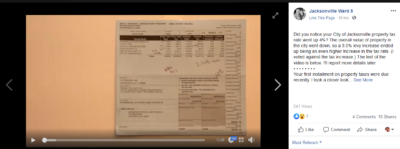Jacksonville residents may be a frustrated with their current property tax installments. Jacksonville Ward 5 Alderman Steve Warmowski, in a Facebook post late Wednesday night, voiced some of those frustrations in a highly detailed look at his own tax bill in a YouTube video. Warmowski explained calculations based on the supposed 3.5% tax levy passed by the Jacksonville City Council last November.
Warmowski explains the point of the video: “If you look at the video, you can see the city passed a 3.5% tax levy increase. Pretty much, it was around a 3.5% actual tax increase. It was actually a bit more than that because the overall value of assessed value on the property in town went down. The real property tax rate increase was 4%. On the other side of the coin, the county and the school district passed a 2.1% levy increase, which is the most they could do with tax caps. Their actual tax increase was actually 1.5% because they had more growth out in their tax base.”
Jacksonville is currently a Home Rule municipality governed by Truth In Taxation Laws, according to Warmowski. Truth in taxation laws state that any home rule entities that raise their tax levy above 5% must hold public meetings for the sake of transparency to let residence know why property taxes are going up to that amount. Since Jacksonville District 117 and the county at-large do not fall under home rule, they have to follow the Consumer Price Index, which is percentage by the State of Illinois.
Warmowski explains how the city can stop raising property taxes. “The basic thing is if the city raises the property tax levy, your property taxes go up. The only way for the property tax levy not to go up is for their to be growth on new property, new construction within the city or for the city to not vote to increase the levy.”
County Assessor Allen Vogt corroborated Warmowski’s statements about tax increases not being the responsibility of the county. Vogt explains: “The taxy levy has nothing to do with the assessment of the property. We set the assessments here in my office. Our assessments are set based on one-third of the marketable value of the property. What the city levies on property taxes is a completely different animal, we have no control of that here and what the rate went up to for some people, I have no control over that either.”
Vogt says that the blame on the county assessor’s office and county officials are misplaced when it comes to property taxes. “It’s not my office’s fault. We set the assessments on property. Some areas of the City of Jacksonville’s property assessments went up, some stayed the same, some actually decreased depending on the neighborhood and the sales of property there within the last 3 years to indicate where our assessment level formulas should be for that property’s value.”
Warmowski warns of the danger that lies ahead for future tax burdens in the City of Jacksonville. “The basic issue is that the city’s population is not growing. If you look at the property tax value in the city, it’s not growing. You have more and more money going out from the same or less people. It’s going to catch up to us eventually. I think at some point eventually the city is going to have to pass a tax cap eventually, similar to what the school district and county has to do, and not pass a rate increase above the CPI. Kind of like voluntarily living under a tax cap, or we should do a tax freeze. We just have to make some hard decisions. We may have to cut some personnel or do something at the city level to not increase the tax burden on people. At the same time, we have to strike a balance.”
Warmowski believes that the property tax issue and the balance of making Jacksonville more attractive to new businesses and to keep residents from leaving is the other responsibility of both the council and the citizens of Jacksonville. Mayor Andy Ezard even had some ideas about different ways mitigating the property tax increases after the city audit this past Monday. “We’re going to internally try to fine tune the property tax levy. I think there might be some other avenues for us to explore – possibly with a sales tax. It wouldn’t possibly just be city employees just paying for our pension obligations. It could be everybody that’s coming into the city to help pay for some of those obligations and mitigate the property tax levy. We had a 3.5% increase this past year. For years it was set at 5%, but we’ve gone down the last few years which is a good trend. I want to take that a step forward and maybe trend down even more to help the taxpayers of the city. Also, I want the city to still provide good services. By maybe implementing a tax across the board, not to just citizens but from folks coming in from out of town, maybe that would be helpful and solve the property tax questions.”
You can find Warmowski’s video along with helpful links about property taxes in Morgan County at his Facebook Page @jaxfive. Residents seeking tax records and information on property assessments can go to morgancounty-il.com.




